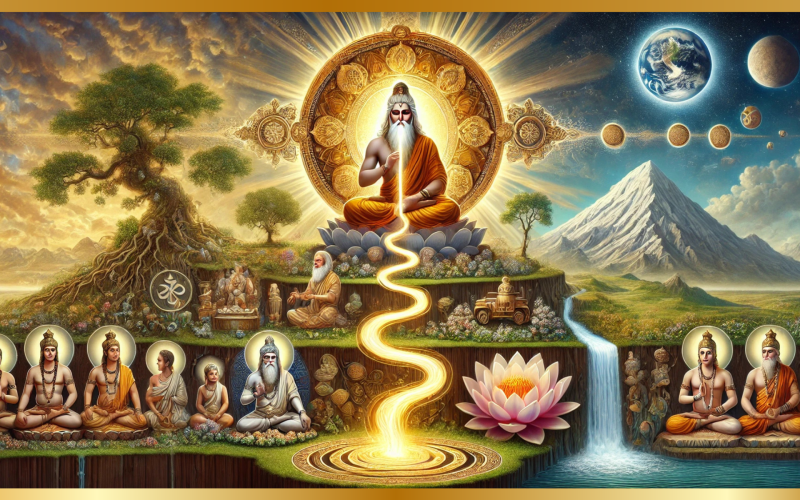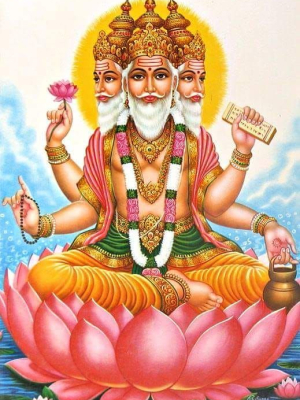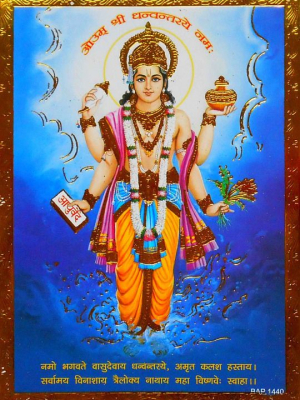Ayurved Avataran: The descent of Ayurved by Brahma on earth

1. The Creation of Ayurveda by Brahma
According to Vedic tradition, the science of Ayurveda was first conceptualized by Lord
Brahma, the creator in the Hindu trinity. Ayurveda is considered an Upaveda (subsidiary Veda) of the Atharva Veda, created to address physical, mental, and spiritual imbalances in
the material world.
● The Need for Ayurveda: Disease and suffering arose as humanity deviated from Dharma (cosmic law) and natural rhythms. Brahma devised Ayurveda to restore balance and harmony.
● Structure of Ayurveda: Brahma formulated Ayurveda as a comprehensive system,
divided into eight branches (Ashtanga Ayurveda) to address different aspects of
health and well-being.

2. Transmission from Brahma to Dhanvantari
Brahma to Daksha Prajapati
Brahma imparted Ayurvedic knowledge to Daksha Prajapati, one of the progenitors of life.
Daksha refined this knowledge and introduced it to the celestial realm.
Daksha to Ashwini Kumars
Daksha passed Ayurveda to the Ashwin Kumars, the twin divine physicians of the gods.
Renowned for their miraculous healing abilities, the Ashwin Kumars demonstrated the
practical applications of Ayurveda, bridging divine knowledge with the medical needs of the celestial beings (Devas). They became the custodians of healing and wellness in the heavenly realms.
Ashwin Kumars to Lord Indra
The Ashwin Kumars transmitted this sacred knowledge to Lord Indra, the king of the gods and protector of Dharma. Indra became the ultimate repository of Ayurveda in the celestial
hierarchy, safeguarding it for a time when humanity would need it most.
3. Dhanvantari’s Role in Ayurveda Avataran
The descent of Lord Dhanvantari marks a pivotal moment in the dissemination of Ayurveda. According to the Puranas, Dhanvantari, an incarnation of Lord Vishnu, emerged during the churning of the ocean of milk (Samudra Manthan) with a pot of Amrita (nectar of immortality) and the knowledge of Ayurveda.
Dhanvantari’s Teachings
Dhanvantari is credited with codifying the knowledge of Ayurveda into practical frameworks for treating diseases, focusing particularly on:
1. Shalya Tantra (Surgery): Introduced advanced surgical techniques and instruments.
2. Holistic Healing: Integrated diet, lifestyle, and spiritual practices for complete well-being.
3. Medicinal Plants and Herbs: Pioneered the use of plant-based remedies.
Dhanvantari’s Descent to Earth :- To propagate this knowledge among humans, Dhanvantari incarnated as a king in Kashi (Varanasi) and taught Ayurveda to disciples like Sushruta, who later became the father of surgery. His earthly mission ensured the preservation and dissemination of Ayurvedic principles.
Festivals and Worship of Dhanvantari
Dhanvantari is honored annually during Dhanteras, celebrated two days before Diwali. On this day, devotees pray for health and well-being and seek his blessings for freedom from disease.

4. The Final Transmission to Humanity
Sage Bharadwaja and Indra, In response to the rising suffering of humanity, a group of sages, led by Sage Bharadwaja, sought out Indra to learn Ayurveda. Indra imparted this divine wisdom to Bharadwaja, who brought it back to Earth and shared it with the sages.
The Role of Rishis- Prominent sages like:
● Atreya: Focused on internal medicine (Kaya Chikitsa).
● Sushruta: Specialized in surgery and anatomy (Shalya Tantra).
These sages compiled their knowledge into classical texts such as the Charaka Samhita and Sushruta Samhita, forming the foundation of Ayurveda as practiced today.
Sacred Transmission Chain of Ayurveda
The sacred chain of transmission can be summarized as:
1. Brahma (Creator)
↓
2. Daksha Prajapati (Cosmic Progenitor)
↓
3. Ashwin Kumars (Celestial Healers)
↓
4. Indra (King of Gods)
↓
5. Sage Bharadwaja (Human Seeker)
↓
6. Atreya, Sushruta, and other sages
↓
7. Humanity through Ayurvedic Texts
The Story of Dhanvantri
The Story of Lord Dhanvantri
The story of Dhanvantari originates in the Puranas, particularly the Vishnu Purana, Bhagavata Purana, and Harivamsa Purana. During the churning of the cosmic ocean of milk (Samudra Manthan) by the Devas (gods) and Asuras (demons) to obtain Amrita, several divine objects and beings emerged. Among them was Lord Dhanvantari, who appeared holding:
1. A pot of Amrita (nectar of immortality),
2. The texts of Ayurveda,
3. Healing herbs.
Dhanvantari is believed to have incarnated on Earth to teach Ayurveda and ensure the health and well-being of humanity. The Sushruta Samhita mentions that Dhanvantari incarnated as a king of Kashi (Varanasi), where he disseminated Ayurvedic knowledge to his disciples.
4. The Final Transmission to Humanity
One of Dhanvantari’s foremost disciples was Sushruta, who is regarded as the father of
surgery. Under Dhanvantari's guidance, Sushruta developed surgical techniques and
codified them in the Sushruta Samhita, which includes:
● Advanced surgical procedures
● Anatomy
● The use of surgical instruments
● Management of wounds and fractures.
Although Dhanvantari is not explicitly mentioned in the Vedas, his essence aligns with the Vedic ideals of healing and immortality. The Vedas emphasize the interconnectedness of body, mind, and spirit, principles that Dhanvantari embodied in his teachings.
Vedic References to Ayurveda Avatarana
1. Atharva Veda
The Atharva Veda is considered the primary Vedic source for Ayurveda. It contains hymns,
rituals, and descriptions related to health, healing, and the use of medicinal plants. Ayurveda is said to have emerged as an Upaveda (subsidiary Veda) of the Atharva Veda.
● Hymns on Healing: The Atharva Veda discusses the treatment of diseases using
herbs, mantras, and rituals.
● Medicinal Plants: It identifies plants with healing properties and outlines their uses.
● Healing through Mantras: The use of sound and vibration for curing ailments is detailed.
The Atharva Veda describes disease as a disruption in the balance between the individual
and the cosmos, a concept central to Ayurveda.
2. Rig Veda
The Rig Veda contains references to the Ashwin Kumars, the twin deities of medicine, who play a significant role in Ayurveda’s divine descent. The Ashwins are often invoked for their miraculous healing abilities.
● Ashwin Kumars’ Healing Acts: The Rig Veda mentions their cures for blindness, lameness, and diseases through divine methods, reflecting the advanced understanding of health and wellness.
● Early Herbal Knowledge: Several hymns in the Rig Veda praise herbs and their
healing powers, laying the foundation for Ayurvedic pharmacology.
3. Yajur Veda
The Yajur Veda focuses on rituals and sacrifices, but it also mentions the use of herbs and medicines in sacrificial offerings.
● Healing Rituals: The Yajur Veda incorporates healing practices as part of sacred rituals, linking physical health with spiritual well-being.
● Herbal Preparations: It highlights the preparation of medicinal concoctions, a precursor to Ayurvedic formulations.
4. Sama Veda
The Sama Veda emphasizes the therapeutic use of sound (Nada) in maintaining health and harmony. While less direct in its references to Ayurveda, the Sama Veda contributes to the understanding of mental and emotional balance.
Why Ayurveda Matters in Today’s World ?
Importance of Ayurved
The pressures of modern life—stress, poor dietary habits, environmental toxins—have led to a surge in chronic diseases and lifestyle disorders. Ayurveda provides an antidote by offering practical tools to prevent and address these issues. At the heart of Ayurveda lies a deep understanding of how your body functions. Our Ayurveda courses are designed to bridge ancient wisdom with modern living, empowering you to take charge of your health.
As we reconnect with the ancient wisdom of Ayurveda, we discover not only a system of healing but also a way to live in harmony with ourselves and the world around us. Whether you’re seeking relief from specific health issues or looking to deepen your understanding of holistic wellness, our Ayurveda courses and consultations are your gateway to transformation. They’ll empower you to unlock the secrets of your body, embrace balance, and lead a vibrant life.
Start your Ayurvedic journey today—your future self will thank you!

